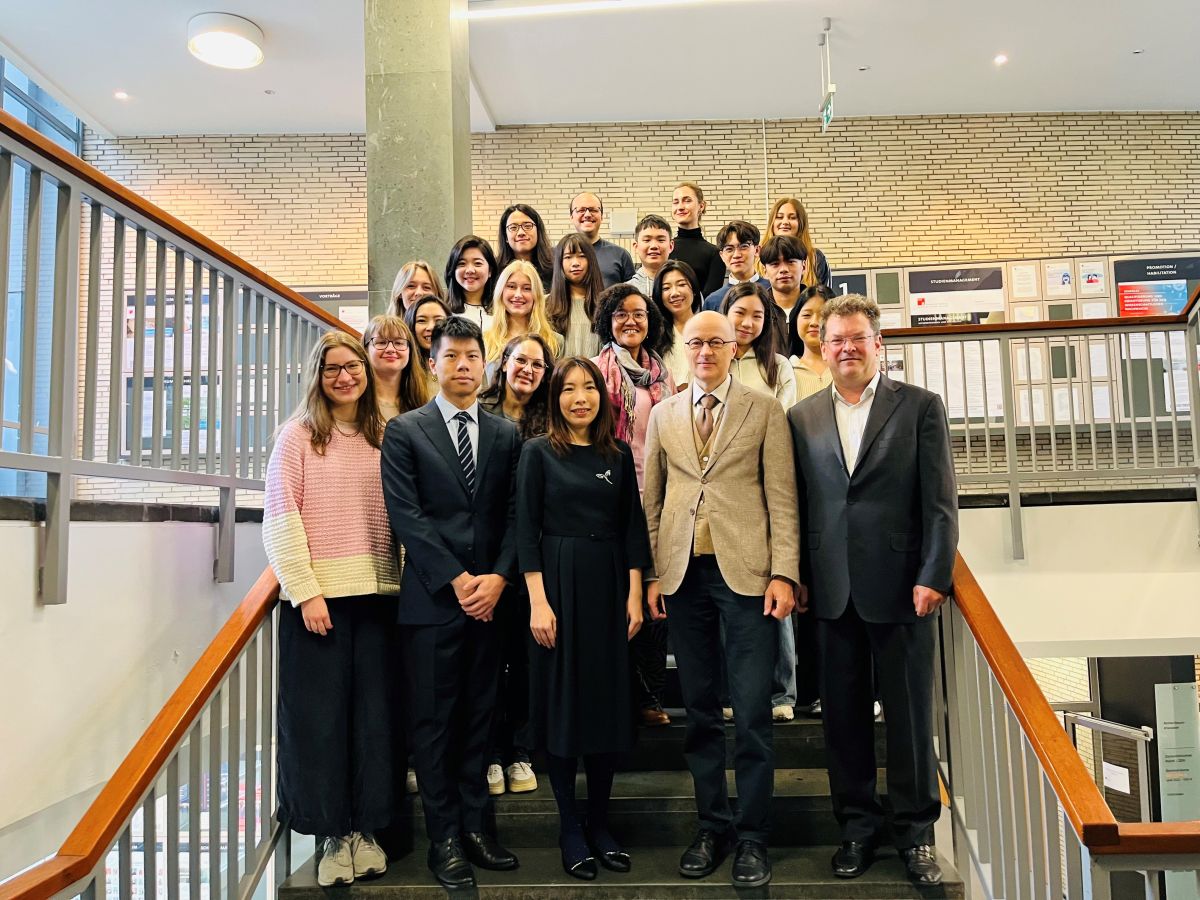In response to the rapidly evolving landscape of artificial intelligence (AI) and its implications for the legal profession, the College of Law at National Taiwan University (NTU Law) continues to lead international academic engagement through cutting-edge educational initiatives. In 2025, the College once again partnered with the University of Hamburg Faculty of Law to offer the second edition of the "Digitalization of Law" transnational intensive course, with a specialized focus on the legal challenges of AI in healthcare. In an era where AI is transforming every corner of society at unprecedented speed, the intersection of AI and healthcare has become a vital frontier. From diagnostic tools and treatment planning to predictive analytics and patient monitoring, AI is reshaping decision-making processes and operational models in healthcare systems. However, this transformation also brings with it complex legal and ethical challenges, including patient rights, data protection, liability, and regulatory frameworks.
To cultivate legal professionals equipped to navigate this emerging landscape, the 2025 course built upon the first edition’s broad exploration of AI and legal systems, delving deeper into medical applications and encouraging students to actively engage in academic research and comparative legal discussion. The program was structured in two phases: the first held in Taipei (April 7 to 17) and the second in Hamburg (June 10 to 20), with 16 students (eight from each university) participating in lectures, site visits, and joint presentations. The Taipei phase featured joint instruction by faculty from both universities, covering topics such as criminal liability in AI-assisted diagnosis, anonymization and protection of medical data, algorithmic transparency, patient autonomy and informed consent, medical ethics, and legal frameworks for AI-powered medical tools. NTU invited experts in criminal law, privacy law, tech law, and bioethics to guide students through theoretical debates and case studies. Students also visited institutions such as the Ministry of Justice Academy for the Judiciary, the Shilin District Prosecutors Office, and the NTU Cancer Center, gaining a deeper understanding of the intersection between law and medicine. In addition to academic sessions, cultural excursions such as visits to the National Palace Museum and the Jing-Mei White Terror Memorial Park helped students contextualize Taiwan’s legal system, political transition, and healthcare governance in the framework of transitional justice. These experiences offered not only historical and political context but also critical insight into how law is shaped by national identity and past trauma.
The Hamburg phase, co-organized by the University of Hamburg Faculty of Law and the University Medical Center Hamburg-Eppendorf (UKE), expanded the interdisciplinary foundation by incorporating clinical insights and a European legal context. Students explored topics such as medical informatics, AI applications in radiology, and ethical concerns in digital medicine. A highlight of this phase was the visit to UKE’s Martini-Klinik, where students observed a live surgery and engaged in discussions about the real-life integration of AI tools in clinical settings. These direct experiences brought legal theories to life and allowed students to critically examine the legal and ethical responsibilities of healthcare providers in AI-assisted environments. Beyond academic activities, the two-week exchanges in both Taiwan and Germany offered students an immersive experience in different legal cultures and social environments. German students, during their April stay in Taipei, engaged with NTU students and faculty, visited institutions, and participated in cultural activities. They encountered Taiwan’s legal and healthcare frameworks and gained unique perspectives on Taiwan’s democratization process, forensic institutions, and public-private healthcare cooperation. Likewise, NTU students in Hamburg not only attended lectures and institutional visits but also experienced German social values, healthcare systems, and professional norms through daily life interactions. This immersive exchange allowed both Taiwanese and German students to deepen their understanding of each other’s legal and healthcare systems. Through classroom discussions and cultural interaction, they gained valuable insight into how societal values influence legal interpretation and policy-making.
Through these mutual experiences, both groups of students developed a richer appreciation for the historical, cultural, and institutional contexts that shape legal systems. They not only recognized the differences between Taiwan and Germany’s legal cultures but also built common ground through academic dialogue, interpersonal trust, and shared reflection. These exchanges enhanced students’ comparative research capacity, critical thinking, and ability to approach global challenges with empathy and nuance. The final two days of the course were dedicated to student presentations, where mixed teams from both universities presented their findings on key legal issues in AI healthcare. Topics included data protection and anonymization, intellectual property in medical AI innovation, algorithmic bias and systemic risks, informed consent under AI assistance, and legal frameworks for AI-driven healthcare commercialization. These presentations demonstrated strong legal reasoning, academic rigor, and cultural sensitivity, and provided a valuable opportunity for students to synthesize their learning.
As a testament to the program’s effectiveness, one student from the 2024 cohort has already initiated the process of applying for a joint doctoral degree program with the University of Hamburg. This tangible outcome reflects the course’s ability to stimulate academic motivation and foster meaningful cross-border academic engagement. It demonstrates that the program is not only a temporary exchange but a catalyst for long-term academic collaboration and the cultivation of global legal scholars. Through this course, which integrates theory, empirical inquiry, and international collaboration, the College seeks to cultivate future legal professionals capable of understanding complex global issues and contributing meaningfully to legal and technological innovation. By spearheading such initiatives, the College of Law reaffirms its commitment to academic excellence, comparative legal education, and interdisciplinary growth on the global stage. By providing students with first-hand insights, intercultural collaboration, and a deep understanding of legal systems in transition, NTU Law continues to nurture a new generation of legal scholars and practitioners prepared to meet the demands of the AI era.

